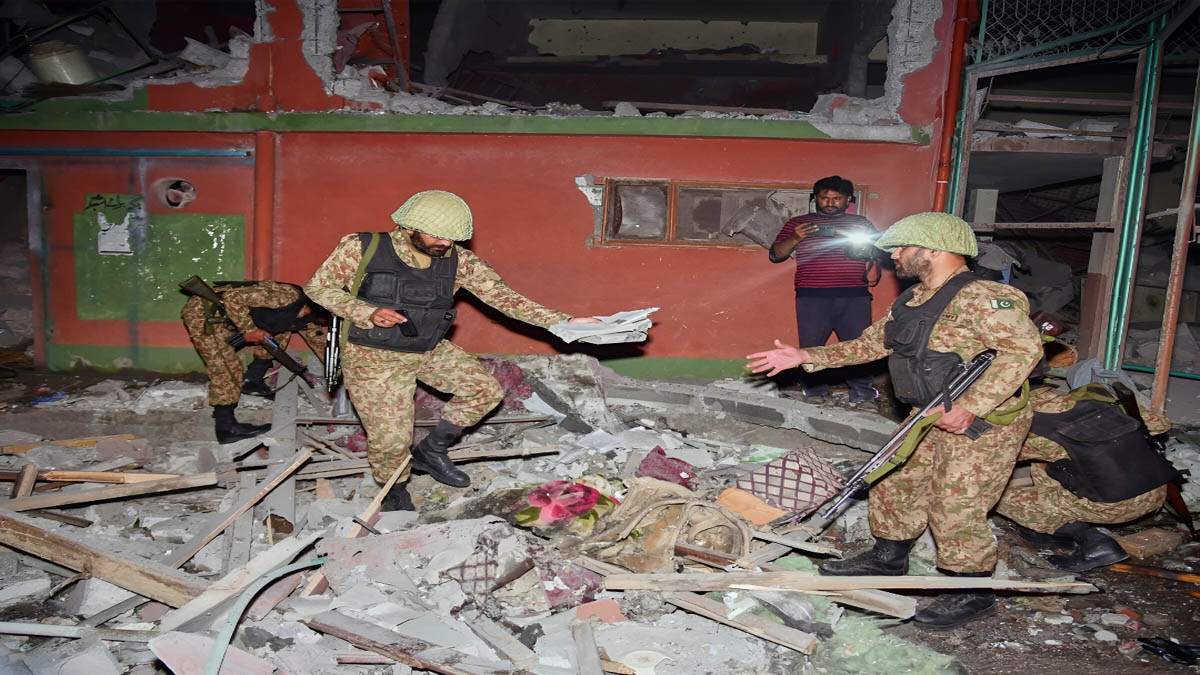Now Reading: Tensions Soar as Pakistan Warns of Nuclear War Risk Following Indian Strikes
-
01
Tensions Soar as Pakistan Warns of Nuclear War Risk Following Indian Strikes
Tensions Soar as Pakistan Warns of Nuclear War Risk Following Indian Strikes

A dangerous escalation has gripped the India-Pakistan region after Pakistan issued a stark warning of a “clear and present” threat of nuclear war following a series of Indian missile strikes. These strikes, which India claims were a targeted retaliation against militant groups responsible for a recent deadly attack on tourists in Indian-administered Kashmir, have killed at least 31 people in Pakistan-administered Kashmir and the Punjab province.
Pakistan’s Prime Minister Shehbaz Sharif vehemently condemned the strikes as an “act of war” and vowed that his country would “avenge the blood of our innocent martyrs.” In a televised address, he stated that Pakistan’s armed forces have been authorized to take “corresponding actions” in response to this aggression, leaving the nature and timing of retaliation deliberately ambiguous.
The heightened rhetoric from Islamabad has triggered widespread international concern, with many fearing an all-out conflict between the two nuclear-armed neighbors. The last major confrontation between India and Pakistan occurred in 2019, following a suicide attack on Indian security forces, which led to Indian airstrikes inside Pakistan and a subsequent aerial dogfight.
Details of the Indian Strikes
India’s Defense Ministry stated that the strikes, codenamed “Operation Sindoor,” targeted at least nine sites where “terrorist attacks against India have been planned.” These locations reportedly included militant hideouts in Pakistan-administered Kashmir and the Punjab province. However, Pakistan’s military disputed this, asserting that the missiles hit civilian infrastructure, including mosques, and resulted in the deaths of women and children.
Adding to the complexity, Pakistan claimed its air force successfully shot down five Indian fighter jets during the operation. While there was no immediate confirmation from the Indian side, reports emerged of three aircraft crashing in villages within Indian-controlled territory.
Pakistan’s Nuclear Warning
The most alarming aspect of the current crisis is Pakistan’s explicit reference to the possibility of nuclear war. While not directly threatening a nuclear first strike, high-ranking officials have alluded to the “existential threat” posed by India’s actions and suggested that all options remain on the table for Pakistan’s defense.
This warning has sent shockwaves across the international community, prompting urgent calls for de-escalation and restraint from global powers and international organizations. The United Nations, the United States, China, and several European and Middle Eastern nations have urged both sides to step back from the brink and engage in dialogue.
International Response and Concerns
The international community is acutely aware of the catastrophic consequences of a nuclear conflict in South Asia. Both India and Pakistan possess significant nuclear arsenals, and any military escalation carries the inherent risk of spiraling out of control.
Several nations have offered to mediate between the two sides, with Iran’s foreign minister reportedly holding separate discussions with both India and Pakistan. However, the deep-seated mistrust and historical animosity between the two nations present significant obstacles to any immediate diplomatic breakthrough.
Ground Situation and Casualties
In addition to the missile strikes, heavy exchanges of artillery fire have been reported along the Line of Control (LoC), the de facto border dividing Kashmir. Both sides have claimed civilian and military casualties as a result of this cross-border shelling.
India reported that at least 13 people were killed and many more wounded in Indian-administered Kashmir due to Pakistani firing. Meanwhile, Pakistan stated that the Indian missile strikes killed 31 people and injured dozens more. These conflicting reports underscore the difficulty in obtaining accurate information amidst the escalating tensions.
Implications and the Path Forward
The current crisis marks a significant escalation in the long-standing rivalry between India and Pakistan. The unprecedented Indian missile strikes deep into Pakistani territory and Pakistan’s subsequent nuclear warning have created a highly volatile situation.
The immediate priority for the international community is to prevent further military escalation and encourage both sides to return to diplomatic channels. However, the path to de-escalation appears fraught with challenges, given the deeply entrenched positions and the heightened nationalist sentiments on both sides of the border.
The world watches with bated breath as the situation unfolds, hoping that cooler heads will prevail and the region can be steered away from the precipice of a potentially devastating conflict.










